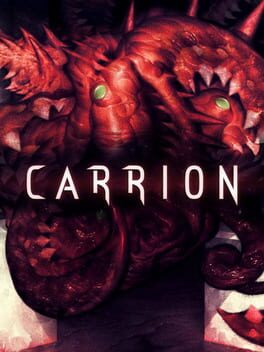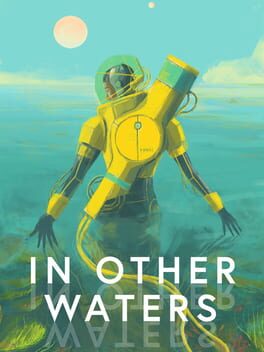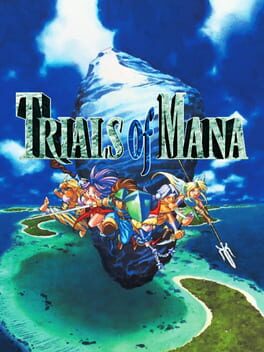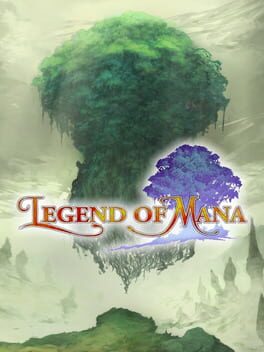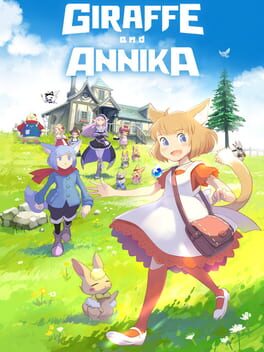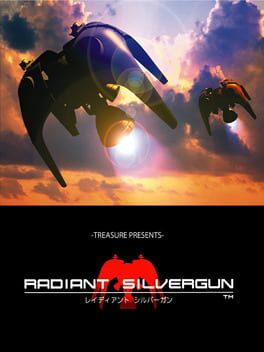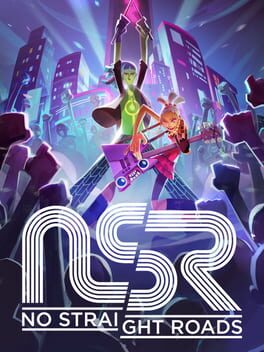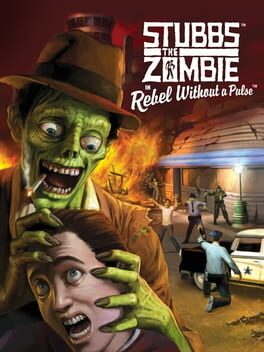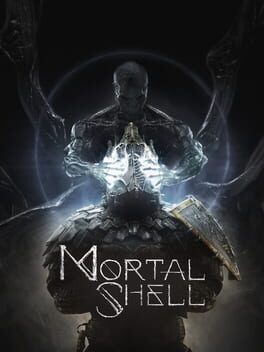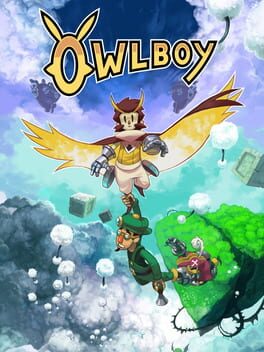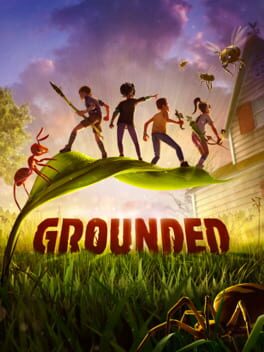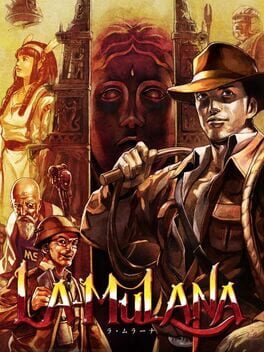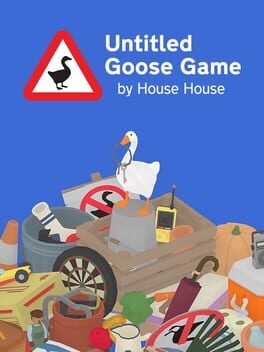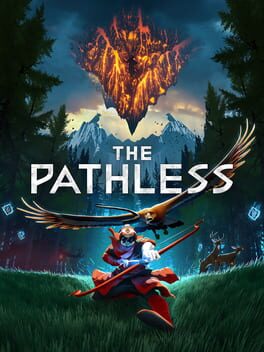BeachEpisode
2020
Giving the player the opportunity to control a terrifying and foreboding fleshy monstrosity, picking off your targets with the animalistic brutality of a pack of hungry lions - much akin to the thing from 'The Thing' or the alien from 'Alien' - Carrion has a fairly unique premise that made me eager to play the game from the day I'd heard of it. Sadly, fails to fully capitalise on the idea's potential.
I feel your mileage for this game will hinge almost entirely on how gratifying you find mindless violence and gore. Personally, I stopped playing with my food barely an hour into the game, when I realised that the enemies are little more than screaming health kits. There is no lore, no dialogue, no justification behind what is happening in this game, outside a handful of "memory" sequences, which were similarly plot anaemic. Novelty can wear thin, and there wasn't a shred of it left come the time the credits to Carrion finally rolled. Encounters and gauntlets quickly become a mere routine that no amount of upgrades could obfuscate. There's only so many times you can hit the same pinata before every last piece of candy has fallen out.
With each level being a samey-looking environment with little to no unique identifying landmarks, and no map to speak of, I found myself completely lost for progress for much of my playthrough. The spritework is stunningly detailed, but none of it clicked with me to a point where I was in awe with what I was looking at. It mostly blurred together as a grossly busy pastiche of repeating assets, vents and corridors. I don't think I ever found myself sure of my place on the map, convincing myself that any step forward I manage to make is by complete coincidence.
The puzzles in this game are impressive, but I can't help but find the size requirements to most of them to be a complete hindrance to the pacing. Pacing back and forward, to and from a blood pool to shrink yourself down so you can use a different set of abilities, then doing the same to size back up. I'm amazed I had the patience.
I can't exactly place why, but Carrion reminds me so much of the PS1 Oddworld games to the point where I wish I was playing those instead. Slig Barracks music played in my head throughout the armory section.
I feel your mileage for this game will hinge almost entirely on how gratifying you find mindless violence and gore. Personally, I stopped playing with my food barely an hour into the game, when I realised that the enemies are little more than screaming health kits. There is no lore, no dialogue, no justification behind what is happening in this game, outside a handful of "memory" sequences, which were similarly plot anaemic. Novelty can wear thin, and there wasn't a shred of it left come the time the credits to Carrion finally rolled. Encounters and gauntlets quickly become a mere routine that no amount of upgrades could obfuscate. There's only so many times you can hit the same pinata before every last piece of candy has fallen out.
With each level being a samey-looking environment with little to no unique identifying landmarks, and no map to speak of, I found myself completely lost for progress for much of my playthrough. The spritework is stunningly detailed, but none of it clicked with me to a point where I was in awe with what I was looking at. It mostly blurred together as a grossly busy pastiche of repeating assets, vents and corridors. I don't think I ever found myself sure of my place on the map, convincing myself that any step forward I manage to make is by complete coincidence.
The puzzles in this game are impressive, but I can't help but find the size requirements to most of them to be a complete hindrance to the pacing. Pacing back and forward, to and from a blood pool to shrink yourself down so you can use a different set of abilities, then doing the same to size back up. I'm amazed I had the patience.
I can't exactly place why, but Carrion reminds me so much of the PS1 Oddworld games to the point where I wish I was playing those instead. Slig Barracks music played in my head throughout the armory section.
2020
A pleasant exercise in minimalism to tell a characterful story in a vibrant world you can only visualise through dots and lines on a radar. Told entirely through a UI styled after a small handful of deep sea equipment, it does wonderfully atmospheric work with its evocative use of seabed imaging and ambient sound design. The narrative itself is fairly rote, but told through a lens so new to me I couldn't help but be enthralled to the end.
Come the midpoint of the game, I found my play cycle and just coasted to the finale with little to no obstruction. Something about how this and games like Killer7 throw an abstract control scheme onto your lap - then expect you to figure it out on your own, is great to me. When it clicks, it's always pretty special.
I dunno, pretty short but really interesting. I enjoyed my time with it, and lament that I don't have much more to spare. I'd love to get all the collectables, would be zen as hell.
Come the midpoint of the game, I found my play cycle and just coasted to the finale with little to no obstruction. Something about how this and games like Killer7 throw an abstract control scheme onto your lap - then expect you to figure it out on your own, is great to me. When it clicks, it's always pretty special.
I dunno, pretty short but really interesting. I enjoyed my time with it, and lament that I don't have much more to spare. I'd love to get all the collectables, would be zen as hell.
1995
(Played on an emulator with a rewind feature, so I could quickly go back and re-do a battle that I lost. Genuinely don't think I'd enjoy this as much as I did without such a great time-saving feature)
Instantly one of my all-time favourite JRPGs. Absolutely incredible spritework that brings the expressive characters and gorgeous environments to life. The soundtrack is a pandora's box of unforgettable melodies. The combat system evolves as you progress and eventually becomes one of the most captivating styles of combat I've ever seen in a JRPG, with its genius obfuscation of an ATB/stamina system. The story is a goofy hodge-podge of every trope imaginable, but the characters are so fun it all strings together perfectly.
Instantly one of my all-time favourite JRPGs. Absolutely incredible spritework that brings the expressive characters and gorgeous environments to life. The soundtrack is a pandora's box of unforgettable melodies. The combat system evolves as you progress and eventually becomes one of the most captivating styles of combat I've ever seen in a JRPG, with its genius obfuscation of an ATB/stamina system. The story is a goofy hodge-podge of every trope imaginable, but the characters are so fun it all strings together perfectly.
1999
After finishing Seiken no Densetsu 3 on the SNES, I was excited to examine what the next entry in the Mana series would entail. Up to this point, I was blessed by a series that seemed to strive to make drastic improvements and changes with each entry. SnD3 expanded on the combat of its predecessor as well as explored how the characters you choose for your party can affect the trajectory of the story, as well as battle dynamics.
Legend of Mana did not let me down, it's wild, something I've sincerely never seen a JRPG pull off before. Rather than having a world map that the player progresses through in whatever line the story dictates, you are instead free to sculpt the world for yourself. Cities, dungeons, fields, landmarks - their locations are all up to the player, and you're tasked with making your own adventure through them. It's insanely cool.
Problems do arise. It leaves nearly everything to your imagination. No quest is given more importance than the next, it seems almost random which ones turn out to be inconsequential side-events, and which are absolutely critical. If you do not enjoy visiting, revisiting, and re-revisiting old areas under different variables (time of the week/characters in the party/different quests completed) you're going to be HARD PRESSED to know what the hell you're supposed to do. Poor signposting all around that really comes to a head at the two-thirds point of the game, where even the guides I found online left me totally lost. A progress roadblock that I found so frustrating I very nearly dropped the game entirely.
Thankfully, I managed to pull through. Much of the game once I finally found my momentum was wonderful, a truly imaginative world that thankfully begs to be explored. The spritework, environments........ It scratches the same itch for me as Final Fantasy 9, in how there are astoundingly few human characters in the overall cast. That level of overt fantasy where much of the cast you can speak to and invite into your party are completely alien to one another - Flying lamp makers with venus fly traps for tails, bartenders made out of puzzle blocks, scholars with snake-like features bursting out of their bandages, a straight up giant teapot. This is the stuff that died the moment gaming entered 3D, and I'd like to make it known I think that's a FUCKING SHAME.
The combat is a revised version of the one introduced to SnD3, veering more towards some very standard JRPG action that I am honestly bored to death of. Once you polish slow and clunky combat enough you start to realise you're removing a level of careful deliberateness to the way you think about your inputs. It's buttery smooth, very easy, completely cheeseable. I like how you can customise what action every button does, but why would you ever not use the counterattacks - they're so gamebreaking they make every encounter a joke.
This game is intensely charming, and clearly made with a lot of love. It shows in almost every corner of its design, but not necessarily where it counts. Some more overt signposting would have made this an out and out classic for me.
Legend of Mana did not let me down, it's wild, something I've sincerely never seen a JRPG pull off before. Rather than having a world map that the player progresses through in whatever line the story dictates, you are instead free to sculpt the world for yourself. Cities, dungeons, fields, landmarks - their locations are all up to the player, and you're tasked with making your own adventure through them. It's insanely cool.
Problems do arise. It leaves nearly everything to your imagination. No quest is given more importance than the next, it seems almost random which ones turn out to be inconsequential side-events, and which are absolutely critical. If you do not enjoy visiting, revisiting, and re-revisiting old areas under different variables (time of the week/characters in the party/different quests completed) you're going to be HARD PRESSED to know what the hell you're supposed to do. Poor signposting all around that really comes to a head at the two-thirds point of the game, where even the guides I found online left me totally lost. A progress roadblock that I found so frustrating I very nearly dropped the game entirely.
Thankfully, I managed to pull through. Much of the game once I finally found my momentum was wonderful, a truly imaginative world that thankfully begs to be explored. The spritework, environments........ It scratches the same itch for me as Final Fantasy 9, in how there are astoundingly few human characters in the overall cast. That level of overt fantasy where much of the cast you can speak to and invite into your party are completely alien to one another - Flying lamp makers with venus fly traps for tails, bartenders made out of puzzle blocks, scholars with snake-like features bursting out of their bandages, a straight up giant teapot. This is the stuff that died the moment gaming entered 3D, and I'd like to make it known I think that's a FUCKING SHAME.
The combat is a revised version of the one introduced to SnD3, veering more towards some very standard JRPG action that I am honestly bored to death of. Once you polish slow and clunky combat enough you start to realise you're removing a level of careful deliberateness to the way you think about your inputs. It's buttery smooth, very easy, completely cheeseable. I like how you can customise what action every button does, but why would you ever not use the counterattacks - they're so gamebreaking they make every encounter a joke.
This game is intensely charming, and clearly made with a lot of love. It shows in almost every corner of its design, but not necessarily where it counts. Some more overt signposting would have made this an out and out classic for me.
2020
This is the type of game I'd love to see accepted more openly by folk, a very laid-back and ambitious c-tier indie game by a very small Japanese group. A very short adventure across an island inhabited by cute characters, and a story that packs a surprising amount of heat. Exploring this island was a genuine joy.
Absolutely wonderful, I wouldn't be surprised if this remains in the top-5 spot on my favourite games from this year.
Absolutely wonderful, I wouldn't be surprised if this remains in the top-5 spot on my favourite games from this year.
1998
Ikaruga, with another colour - so basically, an insanely brutal game for psychopaths. Inspired, methodically designed levels that flow so well, and a weapon system that was equal parts fun and rewarding to (attempt to) master. Possibly the best shmup I've ever played, I can feel Treasure were in the prime of their life through these bosses.
2020
Effervescent and intoxicating. No Straight Roads has some of the most lovingly-crafted visuals I've ever seen, clearly inspired by the likes of Psychonauts era Double Fine, while still making it their own. Wonderful character animations that make fantastic use of 2D animation principles, even with large and boisterous 3D models. Hard not to be a little touched by the Malay influences they managed to squeeze in, like the dikir barat rap battle set to the backdrop of a wayang kulit puppet show.
Where the game really drops the ball for me is the combat - a somewhat basic hack-and-slash action title that teaches the player to dodge attacks in tune with the beat, only to forget about and even contradict that tip for the overwhelming majority of the game, is uniquely frustrating.
No Straight Roads is thoroughly convinced that it is a rhythm game, and even uses the harsh scoring system of titles like IIDX and Pop'n' that judges your performance post-battle and awards upgrade points accordingly. The problem is that attacks are barely choreographed, you receive hits from offscreen and by enemies that all look functionally identical yet have disparate attack patterns. You're very likely to scrape a few C ranks on your first playthrough, through little fault of your own.
Despite my frustrations with the gameplay, I enjoyed the title immensely. No Straight Roads feels like a labour of love, there isn't a lick of cynicism or irony to be found, and instead devotes itself to sharing its passion for its influences in the most bombastic way it could.
Where the game really drops the ball for me is the combat - a somewhat basic hack-and-slash action title that teaches the player to dodge attacks in tune with the beat, only to forget about and even contradict that tip for the overwhelming majority of the game, is uniquely frustrating.
No Straight Roads is thoroughly convinced that it is a rhythm game, and even uses the harsh scoring system of titles like IIDX and Pop'n' that judges your performance post-battle and awards upgrade points accordingly. The problem is that attacks are barely choreographed, you receive hits from offscreen and by enemies that all look functionally identical yet have disparate attack patterns. You're very likely to scrape a few C ranks on your first playthrough, through little fault of your own.
Despite my frustrations with the gameplay, I enjoyed the title immensely. No Straight Roads feels like a labour of love, there isn't a lick of cynicism or irony to be found, and instead devotes itself to sharing its passion for its influences in the most bombastic way it could.
2020
2016
2020
Takes a cute concept and spins it into an algorithm-driven gameplay loop completely barren of any soul. Totally threadbare in terms of characters, questlines or narrative. There was nothing keeping me attached to this game aside from rather frantically exploring the admittedly gorgeous and well-realised map to find something that could make the data entry-esque gameplay feel worth it. It's in early access at the time of writing this review - and if history has proven anything, it will feel unfinished long after it hits 1.0. Worthless.
2020
2012
A puzzle box of meticulous design, and it actually summons a Hellraiser.
Over time, this title's reputation started to seep into my skin and conditioned me to believe that it is bitterly unfair, that an element of clairvoyance is necessary, that hints to solutions simply do not all exist within the text.
This was my first replay after many years, and it served to prove to me that it's all true - the biggest clue is actually in the manual.
Very clearly inspired by Masacore indie titles, built top of its more direct Maze of the Galeous roots, La-Mulana takes the crown of the cruel genre by being one of the only entries with a beating heart. A sprawling structure that demands intuition and respect in regular doses. Fall out of line for even a second, and you're inviting your archeological gig to end prematurely in sharp, fiery death. Bosses use every cheap trick in the book. Fields populate with countless enemies that exist purely to halt all progress. Completely untelegraphed traps jump up and kill you with reprise. All this, made feasible with a generous checkpoint and teleportation system, it's kind of genius.
Soundtrack is a bop, too. Invites you to the challenge and remains a toe tapper throughout.
https://www.youtube.com/watch?v=-rfhi6I84hM
Puzzle design like this remains unmatched in anything outside of a Cyan Worlds point & click game. Every single screen holds an element of a grander puzzle, each with an inspiring level of thematic relevance. Their biggest crime would be dodgy wording in places. There isn't another Metroidvania in the world where every single room is equally important. All this, and the final task is to fold the ruins in on itself like an Origami butterfly, opening up a whole new layer of appreciation for the painstakingly crafted world Nigoro has created.
In the interest of sounding unbiased, it's definitely imperfect. Lots of iffy collision, a trial and error, and sheer leaps of logic are afoot. The later bosses are cruel to comedic degrees. All of these are astoundingly valid reasons to despise or drop this game..................... I just think it's uniquely satisfying to overcome the trials regardless - a nailscraping crawl to a victory that you need to fight tooth and nail to earn. To the last, I grapple with thee. from hell's heart, I stab at thee. for hate's sake, I spit my last breath at thee.
Over time, this title's reputation started to seep into my skin and conditioned me to believe that it is bitterly unfair, that an element of clairvoyance is necessary, that hints to solutions simply do not all exist within the text.
This was my first replay after many years, and it served to prove to me that it's all true - the biggest clue is actually in the manual.
Very clearly inspired by Masacore indie titles, built top of its more direct Maze of the Galeous roots, La-Mulana takes the crown of the cruel genre by being one of the only entries with a beating heart. A sprawling structure that demands intuition and respect in regular doses. Fall out of line for even a second, and you're inviting your archeological gig to end prematurely in sharp, fiery death. Bosses use every cheap trick in the book. Fields populate with countless enemies that exist purely to halt all progress. Completely untelegraphed traps jump up and kill you with reprise. All this, made feasible with a generous checkpoint and teleportation system, it's kind of genius.
Soundtrack is a bop, too. Invites you to the challenge and remains a toe tapper throughout.
https://www.youtube.com/watch?v=-rfhi6I84hM
Puzzle design like this remains unmatched in anything outside of a Cyan Worlds point & click game. Every single screen holds an element of a grander puzzle, each with an inspiring level of thematic relevance. Their biggest crime would be dodgy wording in places. There isn't another Metroidvania in the world where every single room is equally important. All this, and the final task is to fold the ruins in on itself like an Origami butterfly, opening up a whole new layer of appreciation for the painstakingly crafted world Nigoro has created.
In the interest of sounding unbiased, it's definitely imperfect. Lots of iffy collision, a trial and error, and sheer leaps of logic are afoot. The later bosses are cruel to comedic degrees. All of these are astoundingly valid reasons to despise or drop this game..................... I just think it's uniquely satisfying to overcome the trials regardless - a nailscraping crawl to a victory that you need to fight tooth and nail to earn. To the last, I grapple with thee. from hell's heart, I stab at thee. for hate's sake, I spit my last breath at thee.
2019
2020
Hard to express my disappointment in Giant Squid's output. It wasn't until the last legs of this game that I learned it was by that studio; the developers of Abzu, and offshoots of the crew from Thatgamecompany - but it contextualised everything.
It's almost insulting how formulaically they seem to conceive their titles, they might just continue to make 'emotional, artsy' games where the Good Blue defeats the Evil Red until heat death. It's all too convenient, it's the type of theming you come up with while playing Halo multiplayer, made all the less engaging and challenging when you take into account that it follows the very same beats as Flower, Journey, and now Abzu. Giant Squid's games feel robotic, outside of paying the aesthetics lipservice, there is no narrative throughline to keep them together, everything feels present because "they should be" rather than because there is a story that needs told.
It takes more key inspiration from Shadow of the Colossus this time around, the framing and gameplay is essentially identical. This only serves to make Giant Squid's unsubtle hand cause ripples throughout the game at the absolute worst moments. Trying to conjure the quiet grace of Team Ico in one scene, then throwing a tutorial prompt that pauses the game at your face which reads "Press and hold flap while gliding to perform a Super Flap. This powerful move will consume a large number of flaps.", I couldn't help but laugh.
Pathless was not without merit - if it innovated at anything, it was making the normally tedious task of travelling across a vast videogame landscape into a far more engaging affair. A sprint meter that would only get refilled with well-timed shots at ever-present targets that litter the world map. I'll miss those next time I'm expected to hold the analogue stick forward for ten minutes to heavily approach a waypoint on the other side of an empty grassy field. Also present is some nice music that punctuates key setpiece events, including some very engaging boss chase sequences.
It's almost insulting how formulaically they seem to conceive their titles, they might just continue to make 'emotional, artsy' games where the Good Blue defeats the Evil Red until heat death. It's all too convenient, it's the type of theming you come up with while playing Halo multiplayer, made all the less engaging and challenging when you take into account that it follows the very same beats as Flower, Journey, and now Abzu. Giant Squid's games feel robotic, outside of paying the aesthetics lipservice, there is no narrative throughline to keep them together, everything feels present because "they should be" rather than because there is a story that needs told.
It takes more key inspiration from Shadow of the Colossus this time around, the framing and gameplay is essentially identical. This only serves to make Giant Squid's unsubtle hand cause ripples throughout the game at the absolute worst moments. Trying to conjure the quiet grace of Team Ico in one scene, then throwing a tutorial prompt that pauses the game at your face which reads "Press and hold flap while gliding to perform a Super Flap. This powerful move will consume a large number of flaps.", I couldn't help but laugh.
Pathless was not without merit - if it innovated at anything, it was making the normally tedious task of travelling across a vast videogame landscape into a far more engaging affair. A sprint meter that would only get refilled with well-timed shots at ever-present targets that litter the world map. I'll miss those next time I'm expected to hold the analogue stick forward for ten minutes to heavily approach a waypoint on the other side of an empty grassy field. Also present is some nice music that punctuates key setpiece events, including some very engaging boss chase sequences.
